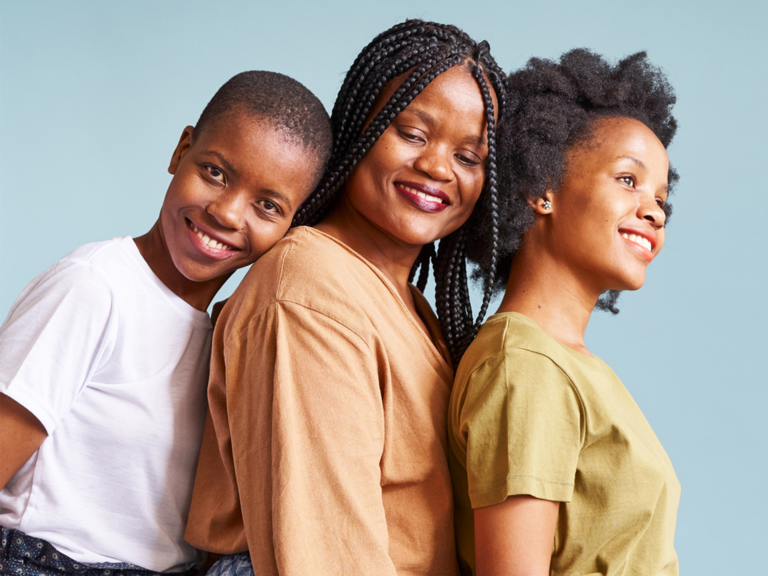Eldest Daughter Syndrome Can Impact Your Romantic Relationships, Sis

"Are you okay, or are you an eldest daughter?" If you, dear eldest born, have been feeling called out by TikTok lately, know you're not alone. Social media is full of older sib check-ins after the term 'eldest daughter syndrome' took off on various platforms. While not an official psychiatric diagnosis, as a search inquiry, eldest daughter syndrome has surpassed 67 million TikTok views, with users sharing and posting videos that air common grievances and personality traits that come with filling the familial role. Think Daphne Bridgerton (Bridgerton) and the animated Elsa from Frozen need a support group or something?
As past experiences and familial dynamics can affect behavior, communication and current relationships, we naturally began to wonder how eldest daughter syndrome (EDS) plays into romantic partnerships. Are there commonalities around how the eldest born may stereotypically behave and communicate in a romantic relationship? We explore below.
Meet the Experts:
- Dr. Kate Balestrieri is a Licensed Psychologist, Certified Sex Therapist, Founder of Modern Intimacy, and the host of the Get Naked with Dr. Kate podcast. You can follow her on TikTok and Instagram @drkatebalestrieri.
- Dr. Lisa Paz is a Marriage, Sex and Family Therapist in a private practice. She is also an adjunct faculty member at the University of Miami. Follow her on Instagram at @DrLisapPaz.
In this article:
- What Is Eldest Daughter Syndrome?
- Eldest Daughter Syndrome and Romantic Relationships
- How to Cope with Eldest Daughter Syndrome
- How to Help Your Partner Overcome Eldest Daughter Syndrome
What Is Eldest Daughter Syndrome?
Shout-out to the Marcia Bradys of the world: "Eldest daughter syndrome refers to the nuanced role between parent and child many first-born daughters experience in families, both in childhood and as adults, that places both implicit and explicit social and psychological pressures on them to care for their family members," Dr. Kate Balestrieri explains.
Again, while not an officially recognized mental health disorder or affliction, eldest daughter syndrome can be viewed as a branch of birth order theory—an early 20th-century psychological theory that explores how birth order can impact one's childhood development and lifelong personality traits.
Moreover, there are some stats to back up the EDS concept: A University of California, Los Angeles-led research team recently found that a selection of oldest daughters of pregnant mothers matured faster (i.e. showed early signs of adrenal puberty) if their mothers had high levels prenatal of stress. This finding supports the reported commonality of eldest daughters being expected to fulfill adult-like responsibilities in many families.
The Often-Expected Responsibilities of Eldest Daughters
"Eldest daughters are often parentified and given responsibilities akin to a contributing adult in the family," says Dr. Balestrieri. "They may be expected to contribute to the household chores and domestic labor in the home, provide often unpaid childcare for younger siblings or to even chip to the family's expenses financially."
Dr. Lisa Paz agrees: "The eldest daughter is thought to be the one to take the reigns over in the family whether she wants to or not. Aging parents and family issues often become hers to manage."
Additionally, an increased demand for emotional labor—not just physical—is also often put upon the oldest sibling. "Unpaid emotional labor is often expected, demanded or extracted from eldest daughters," adds Dr. Balestrieri. This may look like providing emotional support for or serving as a mediator between parents and other siblings, keeping the peace or acting as a surrogate spouse or friend to an adult family member.
"Her needs are often minimized or dismissed, or rarely even considered," says Dr. Balestrieri, "as it is the eldest daughter's implicit role to be a liaison between the siblings and parents and a representative of the family image to the outside world."
Eldest Daughter Syndrome and Romantic Relationships
Eldest daughter syndrome isn't something that's "cured" when one moves out of their childhood home. The common experiences of eldest daughters can have a lasting impact, influencing how they may relate to others or behave in romantic relationships. If the eldest daughter is in fact tasked with these extra emotional, physical, intellectual and financial roles, explains Dr. Paz, the ramifications and potential stress can seep into their primary romantic relationship.
For example, experiencing parentification in one's family of origin can correlate to an inclination to shoulder the brunt of emotional responsibility and compromise in other relationships or partnerships. As Dr. Balestrieri explains, "Used to over-functioning in domestic life, she may carry forward a sense of responsibility to ensure everything runs well in the relationship, which can look like slipping into caretaker mode, and not expecting reciprocal nurturing or attunement."
"She may struggle to prioritize her own needs over her partner's and assert and maintain boundaries, or fear rejection or abandonment should she express her authentic needs," which could lead to an uneven distribution of emotional and domestic labor, adds Dr. Balestrieri.
Even if an eldest daughter struggles to recognize the disparities in her romantic relationship(s), left unsupported or even taken advantage of by her partner, these issues can leave her emotionally and physically drained. "She may accept crumbs of attunement from a partner who benefits from her dutiful execution of care tasks and emotional labor, and find herself exhausted and depleted," says Dr. Balestrieri.
"The systemic nature of an over-functioning partner with an under-functioning partner is a breeding ground for resentment, physical and mental health issues and significant desire discrepancies in romantic and sexual relationships."
Eldest daughters of the world, we want better for you!
How to Cope with Eldest Daughter Syndrome
Did all that sound familiar, big sis? Many are working to deal with the ramifications of serving as your family's own unpaid intern. If you feel overwhelmed by responsibility, are uncomfortable with your past or present family dynamics or are struggling in your day-to-day life or relationships, reaching out to a licensed mental health professional can help you learn how to put yourself first, set healthy boundaries and more.
To help you get started on your journey—hey, eldest daughters aren't used to asking for help!—Dr. Balestrieri has shared some actionable advice.
Practice Self-Attunement
"Eldest daughters have often been conditioned to self-abandon in service of those around them, and they often struggle to stay present with their own experiences," Dr. Balestrieri explains. "A daily self-care practice that includes mindfulness and somatic practices can help eldest daughters reconnect with themselves and center themselves and their own needs in their daily decision-making process."
"You can't advocate for yourself if you don't know yourself," she says.
Seek Support
Many an eldest daughter has reported being met with a lack of validation when voicing the additional expectations that are expected of them. "That doesn't mean you shouldn't bring it up or suffer in silence," encourages Dr. Balestrieri, "but it may mean getting outside support from other peer groups or a therapist as you explore your family dynamics and experiment with different forms of assertiveness and boundary setting."
Prepare for Anger and Grief
While many a TikTok video has found the humor in the shared experiences of being the eldest daughter, Dr. Balestrieri points out that you may also experience feelings of anger and grief as you begin to explore your familial dynamics.
"It can be difficult to avoid the anger and grief, and many eldest daughters struggle to reconcile their love for their family and their pain or desire for a different relationship with them in the here and now," she says. "Here is where having the extra support of other people (especially other eldest daughters) is essential."
How to Help Your Partner Overcome Eldest Daughter Syndrome
Partners who support one another as they work through mental health struggles, boundary setting and journeys of self-discovery? Green flags all around!
If your partner is working through some of the issues that may stem from unhealthy dynamics in her family of origin, Dr. Paz says that the best place to start is simply asking, 'How can I be there for you?' Additionally, validating their experience—and recognizing your part in any EDS-related dynamics in your own relationship—can go a long way.
Dr. Balestrieri explains: "One of the most healing moments for an eldest daughter is when the people who love her validate that they too observe the dynamic and are committed to making changes that lead to reciprocity and more equity."
That being said, encourage your partner to prioritize themselves (something they may have rarely been "allowed" to do) and step in without asking when they need alone or personal time. Additionally, acknowledge and respect any boundaries they set in your relationship—and support the ones they place for others if they're met with pushback.
"Your accountability and changed behavior creates safety for you both in the relationship," says Dr. Balestrieri, "and will likely lead to better emotional intimacy and a hotter sex life."























